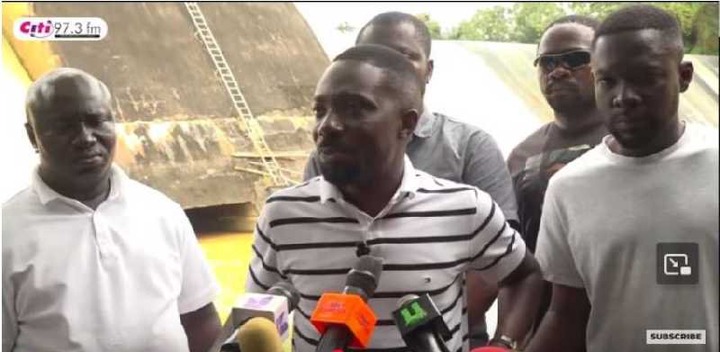Former presidential staffer Dennis Miracles Aboagye has accused the National Democratic Congress (NDC) of consistently shifting blame regarding illegal small-scale mining while failing to confront the galamsey menace when given opportunities to address the crisis.
Aboagye’s criticism follows recent revelations by Minister for Lands and Natural Resources Emmanuel Armah-Kofi Buah that the government’s intensified crackdown on galamsey has resulted in 1,400 arrests within eight months, contrasting sharply with 800 arrests recorded over nearly three years under the previous administration.
The former staffer, who served under the Akufo-Addo administration, outlined a pattern of blame-shifting that he claims spans multiple NDC administrations. According to his analysis, the NDC shifted galamsey blame to their own 2010 administration during 2016 campaigns, and currently attempts to shield that same administration by directing blame toward the 2017 New Patriotic Party (NPP) government.
“It is becoming obvious, the NDC have no record of confronting the Galamsey menace when they get the chance; it’s always about blame shifting. No wonder they are asking for evidence even in the face of obvious escalated Galamsey and polluted river bodies,” Aboagye wrote in a Facebook post addressing the ongoing controversy.
Minister Buah announced the arrest figures during a Wednesday appearance on Ghana Television (GTV), emphasizing that the current strategy delivers measurable results compared to previous approaches. The minister highlighted additional enforcement achievements including the seizure of 440 excavators and more than 800 changfans, while mobilizing Blue Water Guards in key regions.
The Minister revealed that part of the equipment confiscated from illegal mining operations has been reassigned for state use, including the Ministry of Food and Agriculture, demonstrating practical utilization of seized assets in the fight against illegal mining activities.
Beyond enforcement measures, Minister Buah stressed that the government is creating sustainable alternatives for miners seeking to operate legally. “We are also now providing critical alternatives, and we are saying that if you want to do mining, we are going to give you the training and build your capacity to work with large-scale mining companies,” he explained during the television interview.
Responding directly to the minister’s arrest statistics, Aboagye characterized the figures as clear evidence of escalated galamsey activities under the current administration. He specifically addressed Minister of Government Communications Felix Kwakye Ofosu, stating: “This is another clear evidence of escalated Galamsey in our country. 1,400 arrests in just 8 months and yet we still have higher turbidity and worst polluted river bodies.”
The former presidential staffer suggested that underlying motivations continue driving individuals toward illegal mining ventures despite increased enforcement efforts. “Something is motivating the people to rush into this criminal venture. Let’s look into that!” he emphasized in his response to the arrest figures.
Recent reports indicate that Aboagye has been actively presenting what he claims is evidence of aggressive illegal mining in forest reserves across the country, while consistently criticizing the NDC government’s approach to combating galamsey.
The political exchange reflects broader tensions between Ghana’s major parties over environmental protection strategies and accountability for the galamsey crisis that continues threatening water bodies and forest reserves nationwide.
Aboagye called for unity in addressing the environmental challenge, writing: “More reasons why we should have a united voice and call on our government to take decisive actions in dealing with the menace.” His statement suggests that political divisions may be hindering effective responses to the illegal mining crisis.
The debate occurs as environmental activists and civil society organizations intensify calls for emergency measures to address worsening water pollution and forest degradation caused by illegal mining activities across multiple regions.
Minister Buah’s enforcement statistics aim to demonstrate government commitment to tackling galamsey, though critics argue that arrest numbers alone do not necessarily translate to reduced illegal mining activities or improved environmental conditions.
Political observers note that Aboagye previously cautioned the NDC against politicizing galamsey issues, arguing that the problem affects all Ghanaians regardless of party affiliation, though current exchanges suggest continued political divisions over responsibility and solutions.
The government has implemented various strategies including the deployment of military personnel to mining sites, revocation of mining licenses, and prosecution of illegal miners, while also attempting to provide alternative livelihoods for affected communities.
Environmental groups continue monitoring river bodies and forest reserves, documenting ongoing damage while calling for comprehensive solutions that address both enforcement and underlying socioeconomic factors driving illegal mining participation.
The political disagreement over galamsey responsibility reflects broader challenges in Ghana’s democratic discourse, where environmental crises often become entangled with partisan politics rather than generating unified national responses to shared challenges.
As the debate continues, affected communities in mining areas await concrete improvements in water quality and forest protection, regardless of which political party receives credit for successful interventions or blame for ongoing challenges.
The exchange between Aboagye and government officials illustrates persistent tensions over political accountability in addressing environmental challenges that require sustained commitment across multiple administrations and political cycles.
